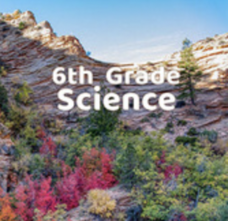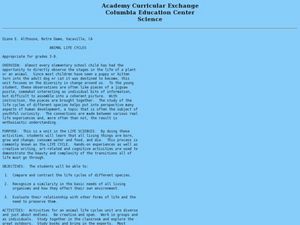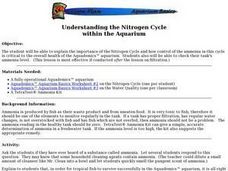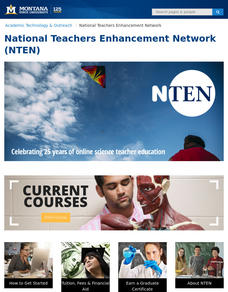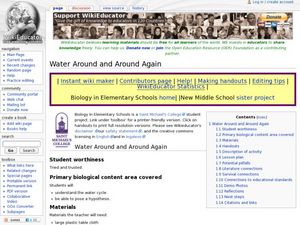Berkshire Museum
The Three Life-Giving Sisters: Plant Cultivation and Mohican Innovation
Children gain first-hand experience with Native American agriculture while investigating the life cycle of plants with this engaging experiment. Focusing on what the natives called the Three Sisters - corn, beans, and squash - young...
Utah Education Network (UEN)
Utah Open Textbook: 4th Grade Science
How does weather affect Earth? Learners understand the characteristics of water and make predictions about weather patterns. They recognize how water and weather affect rocks and minerals through erosion. They also learn about fossils...
Science Matters
Photosynthesis-Cellular Respiration Cycle
The balance of nature can be a wondrous thing! With the 19th instructional activity of the 21-part series on systems, learners explore the cycle of photosynthesis and cellular respiration using a lab-based activity. Groups set up...
Utah Education Network (UEN)
Utah Open Textbook: 6th Grade Science
There are many interactions among living things and their surroundings. By completing a reading, scholars learn about the Earth, the moon, and the sun and how they relate to the solar system. They also investigate the basics of physical...
Curated OER
Water as a Cycle
Students collaborate with a partner to create a large diagram containing one aspect of the water cycle. They are encouraged to include academic language and pictures for their presentation. Their is a peer evaluation sheet that is...
Curated OER
PLANT LIFE CYCLES
Student learns about the life cycle of plants by watching a time-lapse video. This activity provides students with further evidence that all living things grow and change as they progress through their life cycle. Student conducts a...
Curated OER
Animal Life Cycle
Learners conduct hands-on experiments. In this life cycle lesson, students are able to observe a variety of animals as they travel through their life cycle (brine shrimp, mealworms, frog eggs and chicken eggs). Learners respond to what...
Curated OER
Understanding the Nitrogen Cycle within the Aquarium
Students discuss ammonia, and ways it may get into the aquarium. They complete a worksheet about the Nitrogen Cycle. Students learn how to get the ammonia and nitrite out of their aquarium.
Curated OER
Water Cycle: Weather Lesson 1
First graders go on a water walk, collect weather data, and measure rainfall for a month. They examine the water cycle in this series of lessons.
Curated OER
Animal Life Cycles
Students participate in numerous activities to gather information about parts of the life cycle. In this life science lesson, the teacher choose from a number of activities to create or support an interdisciplinary unit about the life...
Curated OER
Parasite Development and Life Cycle
If you are new to teaching agriculture classes, this outline may be helpful when you are preparing a lecture on parasites in livestock. In addition to lecturing on this topic, the lesson plan suggests that learners research the life...
Curated OER
Water and Ice
Students study the water cycle and the different forms of water. In this exploratory lesson plan students observe, measure and describe water as it changes state.
Curated OER
Water and Ice
Students observe what happens to water as it goes from a solid to a liquid. In this exploratory lesson plan students gain an understanding for the water cycle while working in groups observing what happens to water as it changes...
Curated OER
The Water Cycle
Students create an "animated" water cycle wheel that illustrates where water comes from and where it goes.
Curated OER
The Case of the Missing Water
Students examine the major concepts related to the water cycle in this lesson. They recognize and define evaporation, condensation, precipitation and the natural cycles that occur as weather. They also participate in an activity of...
Curated OER
Water World Story
Fourth graders write a story about how a drop of water may have traveled to school. They design a presentation on the water cycle.
Curated OER
Water Quality
Students investigate the water cycle and evaporation. They study the porosity and permeability of groundwater, and the capillary action in soil in this unit.
Curated OER
Water Around and Around Again
Students form a hypothesis for a water cycle experiment. In this water cycle lesson, students create their own environment with water and earth to study the water cycle. Students complete a handout to make a hypothesis and...
Curated OER
Water Supply
Fourth graders explore weather patterns by completing an Internet project. In this water cycle activity, 4th graders read assigned text including a Magic School Bus book about precipitation and water. Students complete a water science...
Wild BC
Carbon - The Short and the Long
For this complex game about the carbon cycle, the playing field is divided into air, living, and earth zones. Children are assigned to be either plants or animals, and collect carbon tokens as they proceed from zone to zone. While the...
Curated OER
Transpiration
Students explain the function of the hydrologic cycle and demonstrate how transpiration rates can be experimentally changed.
Curated OER
Analyzing the Relationship between Snowpack and River Flow
Pupils use the Internet to research current and past snowpack levels and river gauging station readings. They determine the relationship between snowpack and river flow. They predict future river flow.
California Academy of Science
Carbon Cycle Role Play
Anytime you make concepts clear with role playing or hands-on experience, it's a win for the whole class. Ping-Pong balls are used to represent carbon in a carbon cycle role-play activity. In small groups, children first discuss what...
Forest Foundation
Forest Watersheds
Where does the water we use come from? To understand the concept of a watershed, class members study the water cycle and then engage in an activity that simulates a watershed.





